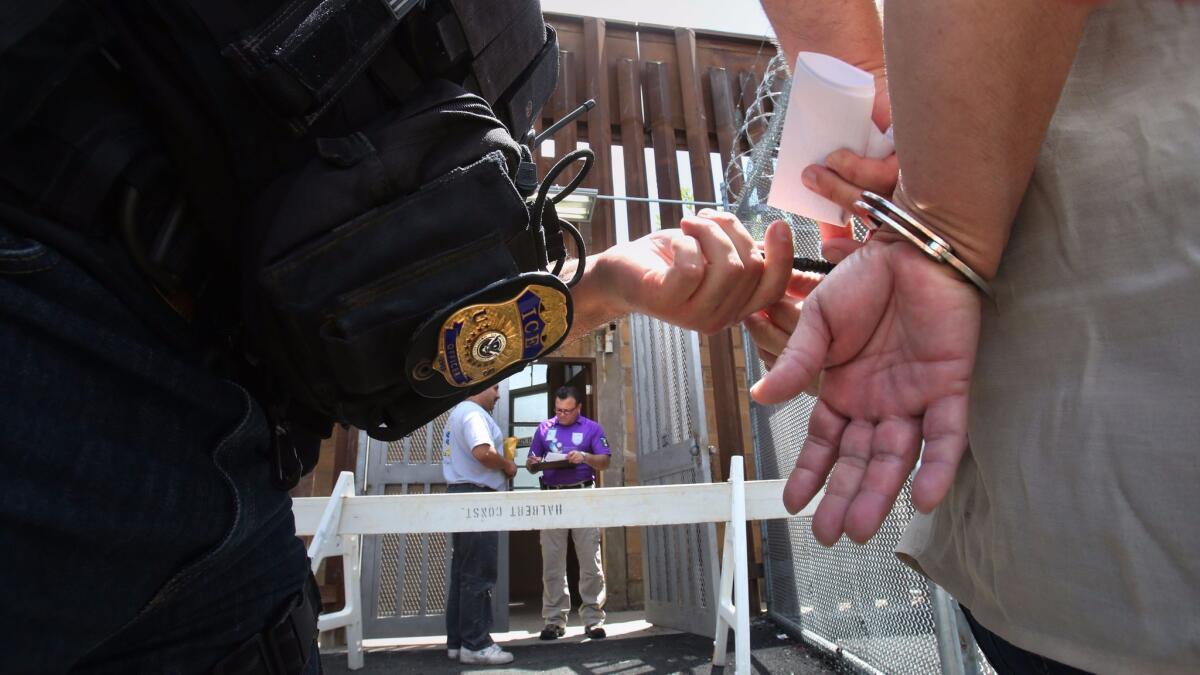ICE in San Diego on pace to deport fewer people than last year, most without a criminal record

- Share via
Immigration and Customs Enforcement in San Diego is on pace to deport fewer people this year than last, most of them unauthorized immigrants without a criminal record.
As of June 30, ICE has deported 16,599 people from San Diego and Imperial counties, according to a summary of removals provided by the agency.
Last year, ICE deported 23,719 individuals from the San Diego and Imperial region. With three months left before the federal fiscal year ends on Sept. 30, it seems likely the agency will end up removing fewer total unauthorized immigrants than last year.
Despite President Trump’s campaign rhetoric of cracking down on immigration violators by targeting “bad hombres” and gang members, most people being removed by ICE in San Diego don’t have criminal records.
ICE deported 6,818 unauthorized immigrants with criminal records in the U.S. through June 30. During the same period, 9,781 individuals without a criminal conviction in the U.S. were deported.
The data reflect the new immigration enforcement regimen put in place under Trump and Atty. Gen. Jeff Sessions, which makes any unauthorized immigrant in the country a target for deportation — not just those with criminal records or who are deemed threats to public safety.
Under the Obama administration, people who were in the country illegally but had not committed serious crimes were not a priority for removal. Instead Obama’s ICE was told to target serious criminal offenders, leaving otherwise law-abiding unauthorized immigrants alone.
That changed in a Jan. 25 executive order from Trump laying out the new rules. While still emphasizing removing people with serious criminal convictions, the order also expanded the pool of people subject to deportation to include those convicted of minor crimes, people who were simply charged with a crime, and those who had prior removal orders from an immigration judge but had ignored them and continued to live in the country.
Lauren Mack, ICE spokeswoman in San Diego, said in a statement that the deportation figures reflect the agency’s new priorities.
“ICE conducts targeted immigration enforcement in compliance with federal law and agency policy,” she said in an email. “However, as ICE Acting Director Thomas Homan has made clear, ICE does not exempt classes or categories of removable aliens from potential enforcement.
“All of those in violation of the immigration laws may be subject to immigration arrest, detention and, if found removable by final order, removal from the United States.”
San Diego immigration lawyer Esther Valdes said she has seen the change in priorities in her law practice. It’s not uncommon for ICE to go to a home or workplace to pick up one person they have targeted because of a criminal record — and come out with several unauthorized immigrants with no criminal convictions but still subject to deportation.
“We’re seeing these clusters of people being picked up, not just one or two,” she said.
Peter K. Nunez, a former U.S. Attorney in San Diego and board member for the Center of Immigration Studies, said the deportation numbers are not surprising.
“The Obama administration made it clear that if you were a non-criminal, you had nothing to fear,” he said. “What Trump and Sessions made clear is while they’ll continue to prioritize criminal aliens, it’s not to the exclusion of other people who were subject to deportation.”
The rise in non-criminal deportations in San Diego runs counter to emerging national trends since Trump’s inauguration. In April, CNN cited ICE national data that showed 30,00 convicted criminals and 23,000 non-criminals deported since January.
Historically, ICE deports more criminals annually than non-criminals, but that has varied in San Diego over the years. In 2014 and 2015, more people with criminal convictions were deported than non-criminals, but the opposite was true in 2013.
Moran writes for the San Diego Union-Tribune.
Twitter: @gregmoran
ALSO
Deportation put on hold for man detained by ICE after dropping daughter off at L.A. school
More to Read
Sign up for Essential California
The most important California stories and recommendations in your inbox every morning.
You may occasionally receive promotional content from the Los Angeles Times.











